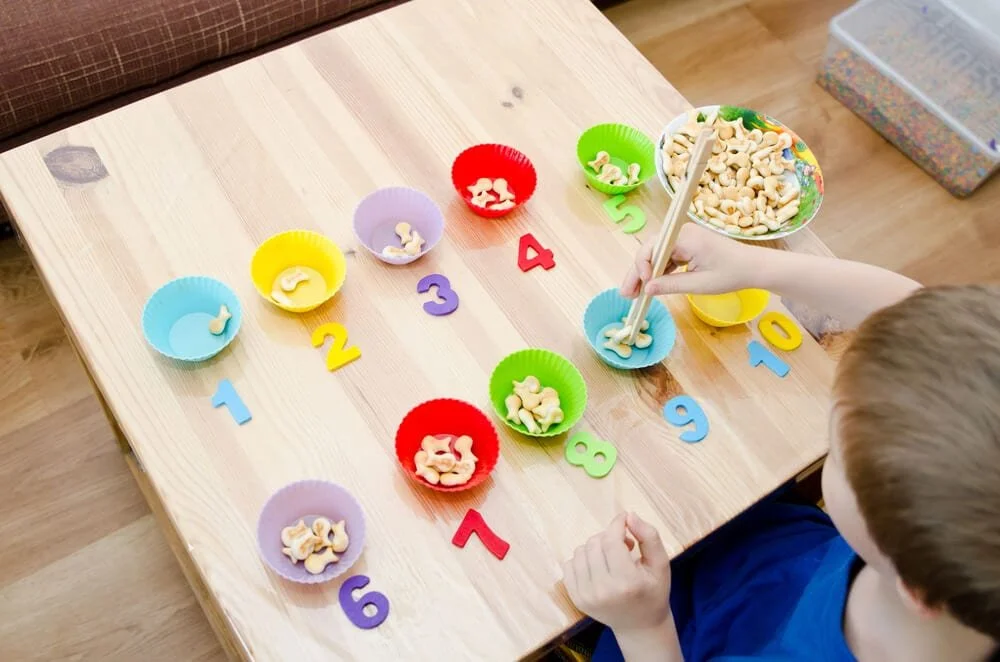Strengthen Core Maths & English Skills with Everyday Activities
Let’s face it: asking your child to sit down and “revise” can sometimes feel like asking a cat to have a bath. But what if we told you that some of the best 11+ prep doesn’t require a desk, a workbook, or even them realising they’re doing it?
We’re sharing clever and easy ways to sneak English and Maths practice into your daily life — no extra screen time, no heavy pressure, just fun, natural learning that really sticks.
Let’s dive in!
Cooking = A Maths Masterclass
Skill focus: Fractions, ratios, decimals, time, and sequencing
Invite your child into the kitchen — not just for taste-testing, but to take the lead in measuring, mixing, and timing.
Why it works:
Cooking involves real-life maths in action — scaling recipes, converting units, and calculating timing. It also builds confidence and independence.
Try this:
“The recipe says 150g of flour for 4 muffins. We’re making 10. How much do we need?”
Let them:
Double or triple ingredients (fractions and multiplication)
Convert grams to kilograms (place value and decimals)
Time baking intervals (elapsed time practice)
Challenge mode: No calculators allowed!
Bonus activity: Bake banana bread and turn the recipe into a maths problem set — then eat the "homework."
Grocery Shopping = Word + Number Power Combo
Skill focus: Mental maths, estimation, persuasive language, comparison, spelling
Take your child from trolley passenger to shopping sidekick.
Before you go:
Ask them to write the shopping list, including quantities.
Practise spelling and grammar in a real-world context.
In-store missions:
Estimate total costs (“How much will our shop be?”)
Compare unit prices (“Which is cheaper per 100g?”)
Spot advertising tricks (“What does ‘farm fresh’ really mean?”)
Why it works:
This activity boosts budgeting skills, critical thinking, and everyday vocabulary — and might just stop them from slipping novelty chocolate into the cart.
TV Shows, But Make It English Revision
Skill focus: Inference, summarising, descriptive writing, vocabulary
Don’t feel guilty about screen time — turn it into a comprehension session (disguised as a chat).
After a show or film, ask:
“What was the main problem in the story?”
“Use three adjectives to describe the main character.”
“What do you think happens next?”
Great options for this:
1.The Boy, The Mole, The Fox and The Horse
2. Blue Planet (narration and visuals = gold!)
3. Horrible Histories (historical facts with a fun twist)
Bonus activity:
Get them to write a mini film review or alternative ending. This flexes:
Imagination
Writing structure
Persuasive and descriptive writing
Plus, it gives you insight into how they interpret stories — a key skill for 11+ English papers!
Car Chats = Verbal Reasoning Time!
Skill focus: Vocabulary, sequencing, synonyms, logic
Stuck in traffic or en route to a sports club? Turn dead time into brain-training time with some verbal reasoning games.
Car Chat ideas:
“I’m thinking of a word that starts with B and means very happy…”
(Answer: blissful, buoyant, beaming)Quick-fire synonyms and antonyms
“What are the steps to make a cup of tea?” (sequencing)
“Which word doesn’t belong: enormous, tiny, huge, gigantic?” (odd one out)
Why it works:
Verbal reasoning is all about language logic. These bite-sized games are fun, flexible, and get kids thinking fast and clearly — no pens needed!
Bedtime = Storytelling Gold
Skill focus: Sentence structure, composition, imagination, vocabularySwap the nightly book for a bedtime story created by... them!
Try this:
Start with a silly prompt:
“A cat finds a secret tunnel under the garden… what happens next?”Take turns telling the story, one sentence at a time.
Add characters, plot twists, and setting details.
Then, ask them to draw one scene from the story!
Why it works:
Storytelling improves:Sentence fluency
Narrative structure
Vocabulary depth
Creative confidence
And it ends the day on a high (and hilarious) note.
The truth is: learning is everywhere. Whether you're mixing muffins, comparing yoghurts, or stuck in traffic, there are hidden 11+ skills waiting to be unlocked.
Ditch the guilt over screen breaks or missed study blocks, and instead embrace the mini-moments that sharpen the brain naturally.
Your child doesn’t need more worksheets — they need more opportunities to use what they know in creative, everyday ways.
Check out our blog post about Study Tips For Exam Success!
Still struggling with course content and exam technique? You might benefit from hiring a tutor. Follow the link below to find out more:


